Report: Talent Management and Leadership Development Analysis
VerifiedAdded on 2022/08/13
|6
|980
|292
Report
AI Summary
This report delves into the concepts of talent management and leadership development. It begins with a personal reflection on the author's experience with talent management within a Small and Medium Enterprise (SME), highlighting the practical application of the QUAD theory, which involves planning, acquiring, developing, and training talent. The report then explores leadership development, examining the behavioral theory of leadership, emphasizing that leadership skills are learned through experience, observation, and training, with the author sharing personal development experiences. Finally, it discusses the participative leadership style, illustrating how involving team members in decision-making can enhance engagement, improve interpersonal relations, and boost employee morale. The report concludes by summarizing the benefits of talent management and leadership development, emphasizing the practical application of the theories discussed.

RUNNING HEAD: TALENT MANAGEMENT AND LEADERSHIP DEVELOPMENT
MANAGEMENT
MANAGEMENT
Paraphrase This Document
Need a fresh take? Get an instant paraphrase of this document with our AI Paraphraser
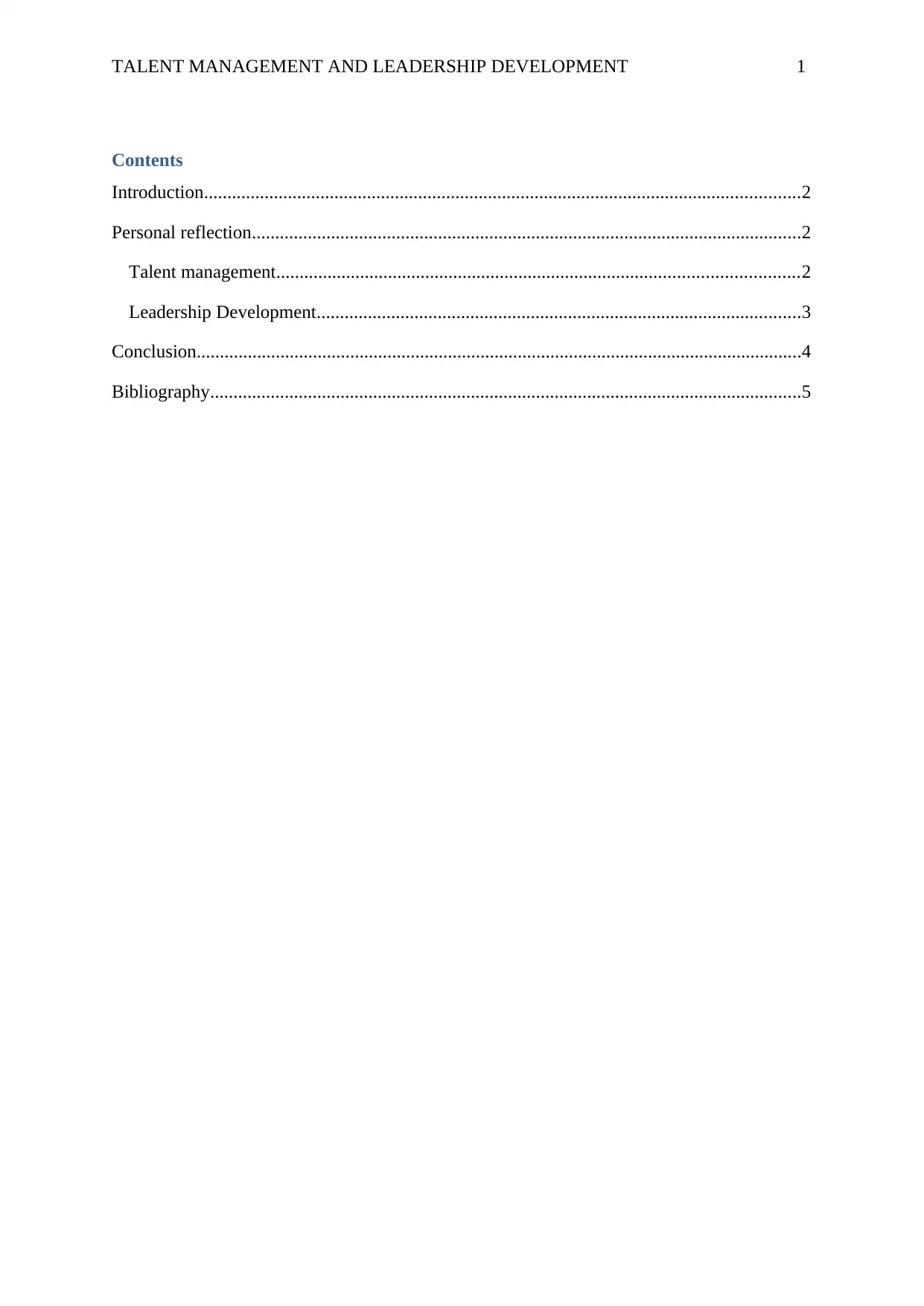
TALENT MANAGEMENT AND LEADERSHIP DEVELOPMENT 1
Contents
Introduction................................................................................................................................2
Personal reflection......................................................................................................................2
Talent management................................................................................................................2
Leadership Development........................................................................................................3
Conclusion..................................................................................................................................4
Bibliography...............................................................................................................................5
Contents
Introduction................................................................................................................................2
Personal reflection......................................................................................................................2
Talent management................................................................................................................2
Leadership Development........................................................................................................3
Conclusion..................................................................................................................................4
Bibliography...............................................................................................................................5
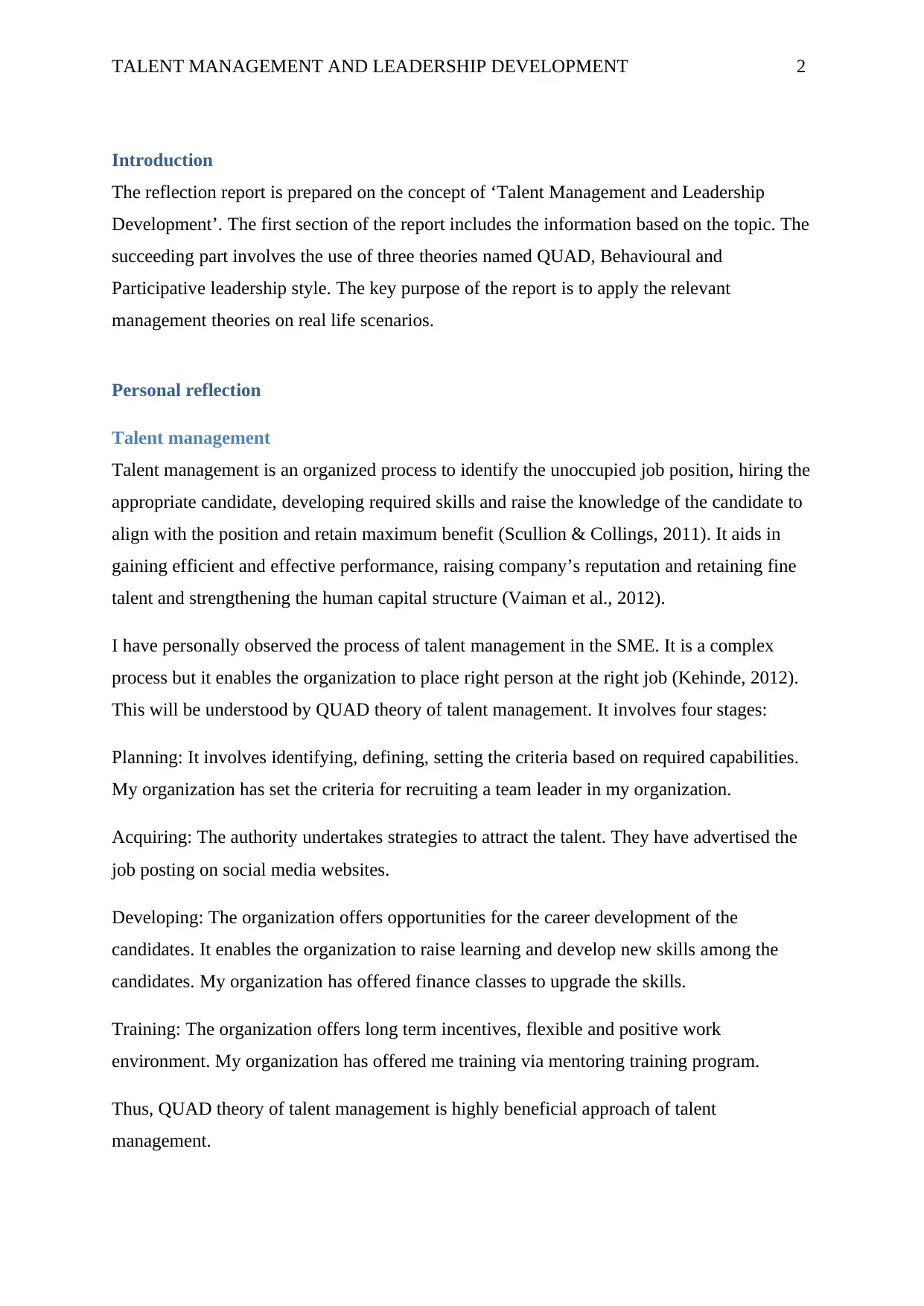
TALENT MANAGEMENT AND LEADERSHIP DEVELOPMENT 2
Introduction
The reflection report is prepared on the concept of ‘Talent Management and Leadership
Development’. The first section of the report includes the information based on the topic. The
succeeding part involves the use of three theories named QUAD, Behavioural and
Participative leadership style. The key purpose of the report is to apply the relevant
management theories on real life scenarios.
Personal reflection
Talent management
Talent management is an organized process to identify the unoccupied job position, hiring the
appropriate candidate, developing required skills and raise the knowledge of the candidate to
align with the position and retain maximum benefit (Scullion & Collings, 2011). It aids in
gaining efficient and effective performance, raising company’s reputation and retaining fine
talent and strengthening the human capital structure (Vaiman et al., 2012).
I have personally observed the process of talent management in the SME. It is a complex
process but it enables the organization to place right person at the right job (Kehinde, 2012).
This will be understood by QUAD theory of talent management. It involves four stages:
Planning: It involves identifying, defining, setting the criteria based on required capabilities.
My organization has set the criteria for recruiting a team leader in my organization.
Acquiring: The authority undertakes strategies to attract the talent. They have advertised the
job posting on social media websites.
Developing: The organization offers opportunities for the career development of the
candidates. It enables the organization to raise learning and develop new skills among the
candidates. My organization has offered finance classes to upgrade the skills.
Training: The organization offers long term incentives, flexible and positive work
environment. My organization has offered me training via mentoring training program.
Thus, QUAD theory of talent management is highly beneficial approach of talent
management.
Introduction
The reflection report is prepared on the concept of ‘Talent Management and Leadership
Development’. The first section of the report includes the information based on the topic. The
succeeding part involves the use of three theories named QUAD, Behavioural and
Participative leadership style. The key purpose of the report is to apply the relevant
management theories on real life scenarios.
Personal reflection
Talent management
Talent management is an organized process to identify the unoccupied job position, hiring the
appropriate candidate, developing required skills and raise the knowledge of the candidate to
align with the position and retain maximum benefit (Scullion & Collings, 2011). It aids in
gaining efficient and effective performance, raising company’s reputation and retaining fine
talent and strengthening the human capital structure (Vaiman et al., 2012).
I have personally observed the process of talent management in the SME. It is a complex
process but it enables the organization to place right person at the right job (Kehinde, 2012).
This will be understood by QUAD theory of talent management. It involves four stages:
Planning: It involves identifying, defining, setting the criteria based on required capabilities.
My organization has set the criteria for recruiting a team leader in my organization.
Acquiring: The authority undertakes strategies to attract the talent. They have advertised the
job posting on social media websites.
Developing: The organization offers opportunities for the career development of the
candidates. It enables the organization to raise learning and develop new skills among the
candidates. My organization has offered finance classes to upgrade the skills.
Training: The organization offers long term incentives, flexible and positive work
environment. My organization has offered me training via mentoring training program.
Thus, QUAD theory of talent management is highly beneficial approach of talent
management.
⊘ This is a preview!⊘
Do you want full access?
Subscribe today to unlock all pages.

Trusted by 1+ million students worldwide
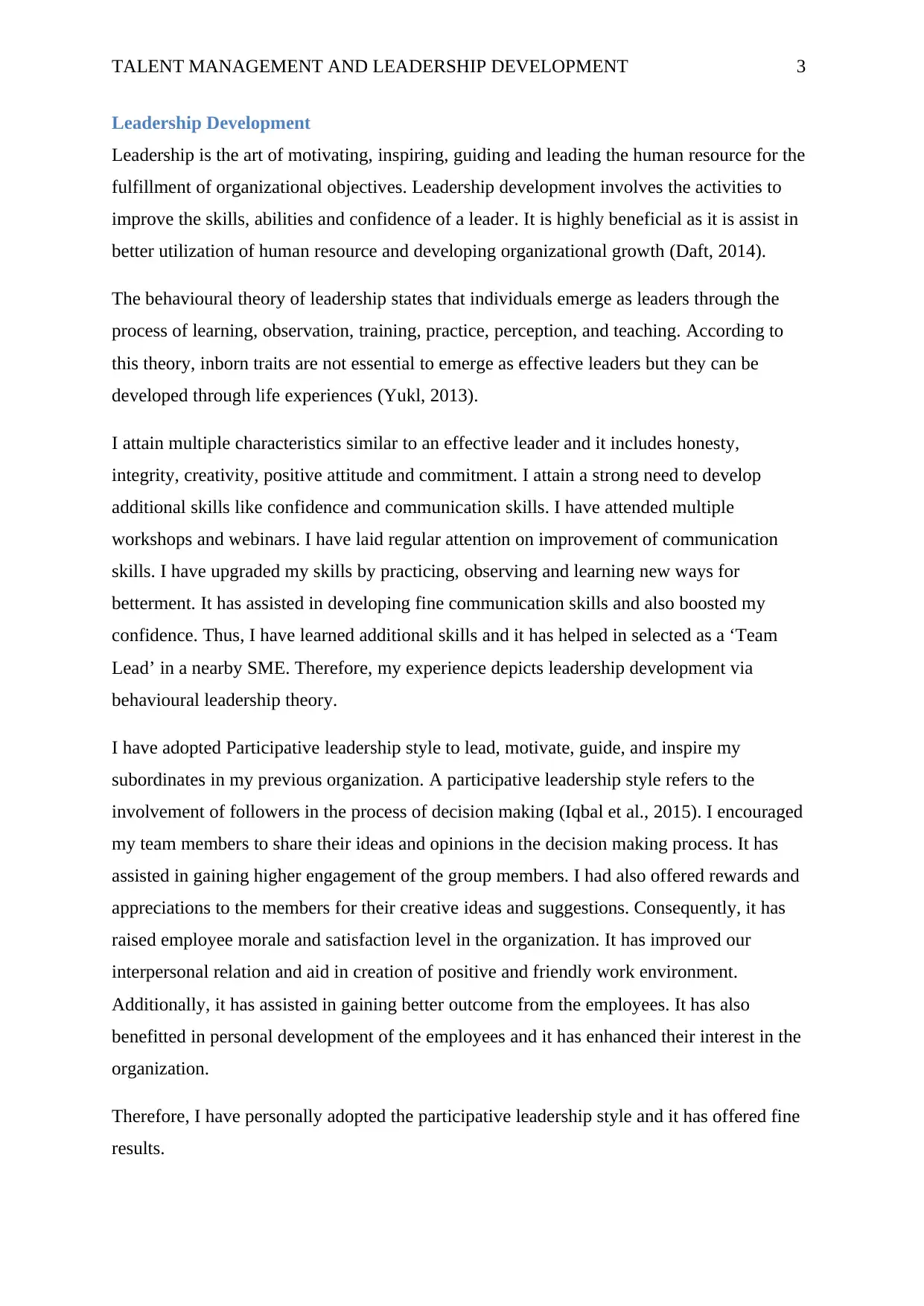
TALENT MANAGEMENT AND LEADERSHIP DEVELOPMENT 3
Leadership Development
Leadership is the art of motivating, inspiring, guiding and leading the human resource for the
fulfillment of organizational objectives. Leadership development involves the activities to
improve the skills, abilities and confidence of a leader. It is highly beneficial as it is assist in
better utilization of human resource and developing organizational growth (Daft, 2014).
The behavioural theory of leadership states that individuals emerge as leaders through the
process of learning, observation, training, practice, perception, and teaching. According to
this theory, inborn traits are not essential to emerge as effective leaders but they can be
developed through life experiences (Yukl, 2013).
I attain multiple characteristics similar to an effective leader and it includes honesty,
integrity, creativity, positive attitude and commitment. I attain a strong need to develop
additional skills like confidence and communication skills. I have attended multiple
workshops and webinars. I have laid regular attention on improvement of communication
skills. I have upgraded my skills by practicing, observing and learning new ways for
betterment. It has assisted in developing fine communication skills and also boosted my
confidence. Thus, I have learned additional skills and it has helped in selected as a ‘Team
Lead’ in a nearby SME. Therefore, my experience depicts leadership development via
behavioural leadership theory.
I have adopted Participative leadership style to lead, motivate, guide, and inspire my
subordinates in my previous organization. A participative leadership style refers to the
involvement of followers in the process of decision making (Iqbal et al., 2015). I encouraged
my team members to share their ideas and opinions in the decision making process. It has
assisted in gaining higher engagement of the group members. I had also offered rewards and
appreciations to the members for their creative ideas and suggestions. Consequently, it has
raised employee morale and satisfaction level in the organization. It has improved our
interpersonal relation and aid in creation of positive and friendly work environment.
Additionally, it has assisted in gaining better outcome from the employees. It has also
benefitted in personal development of the employees and it has enhanced their interest in the
organization.
Therefore, I have personally adopted the participative leadership style and it has offered fine
results.
Leadership Development
Leadership is the art of motivating, inspiring, guiding and leading the human resource for the
fulfillment of organizational objectives. Leadership development involves the activities to
improve the skills, abilities and confidence of a leader. It is highly beneficial as it is assist in
better utilization of human resource and developing organizational growth (Daft, 2014).
The behavioural theory of leadership states that individuals emerge as leaders through the
process of learning, observation, training, practice, perception, and teaching. According to
this theory, inborn traits are not essential to emerge as effective leaders but they can be
developed through life experiences (Yukl, 2013).
I attain multiple characteristics similar to an effective leader and it includes honesty,
integrity, creativity, positive attitude and commitment. I attain a strong need to develop
additional skills like confidence and communication skills. I have attended multiple
workshops and webinars. I have laid regular attention on improvement of communication
skills. I have upgraded my skills by practicing, observing and learning new ways for
betterment. It has assisted in developing fine communication skills and also boosted my
confidence. Thus, I have learned additional skills and it has helped in selected as a ‘Team
Lead’ in a nearby SME. Therefore, my experience depicts leadership development via
behavioural leadership theory.
I have adopted Participative leadership style to lead, motivate, guide, and inspire my
subordinates in my previous organization. A participative leadership style refers to the
involvement of followers in the process of decision making (Iqbal et al., 2015). I encouraged
my team members to share their ideas and opinions in the decision making process. It has
assisted in gaining higher engagement of the group members. I had also offered rewards and
appreciations to the members for their creative ideas and suggestions. Consequently, it has
raised employee morale and satisfaction level in the organization. It has improved our
interpersonal relation and aid in creation of positive and friendly work environment.
Additionally, it has assisted in gaining better outcome from the employees. It has also
benefitted in personal development of the employees and it has enhanced their interest in the
organization.
Therefore, I have personally adopted the participative leadership style and it has offered fine
results.
Paraphrase This Document
Need a fresh take? Get an instant paraphrase of this document with our AI Paraphraser
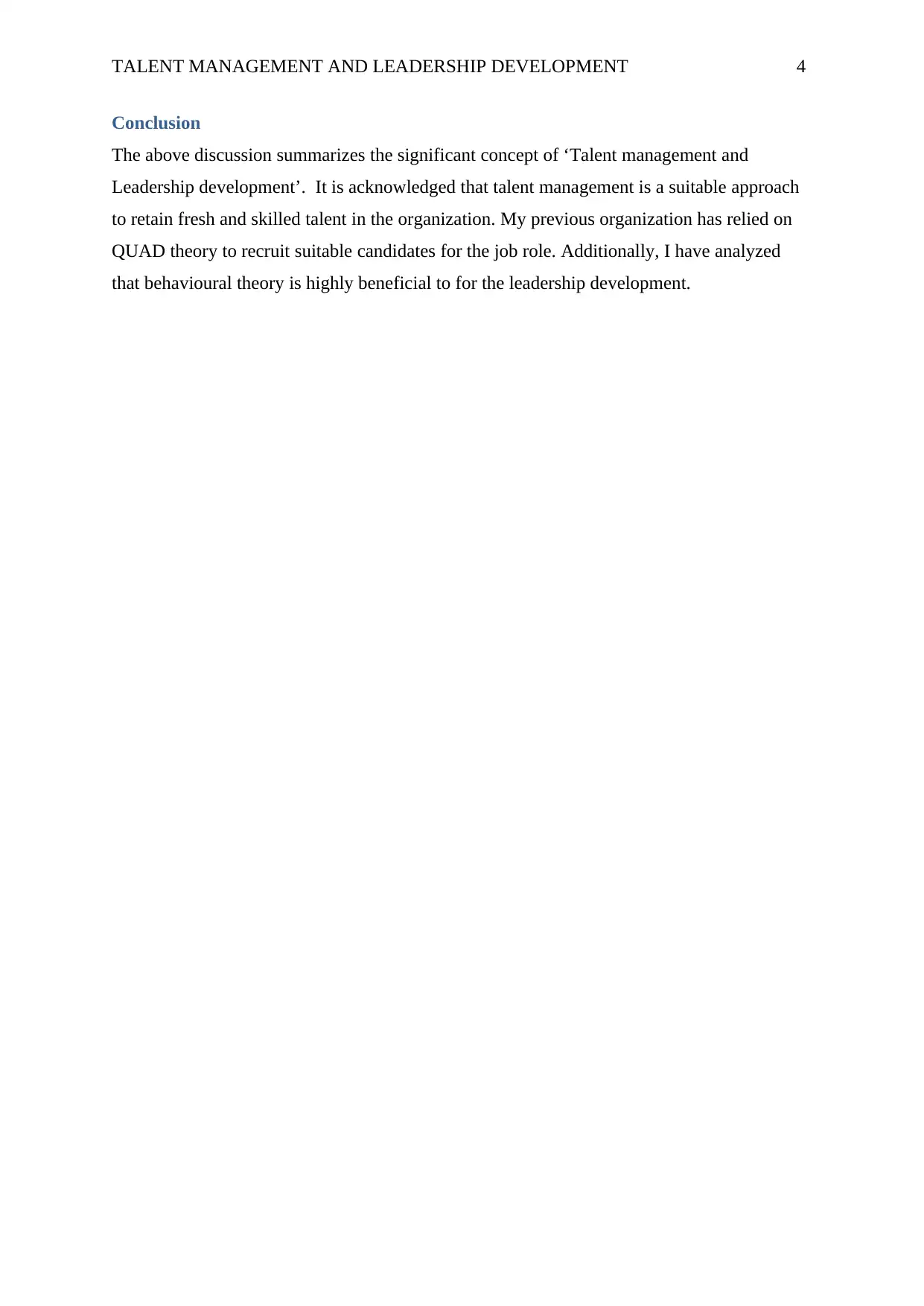
TALENT MANAGEMENT AND LEADERSHIP DEVELOPMENT 4
Conclusion
The above discussion summarizes the significant concept of ‘Talent management and
Leadership development’. It is acknowledged that talent management is a suitable approach
to retain fresh and skilled talent in the organization. My previous organization has relied on
QUAD theory to recruit suitable candidates for the job role. Additionally, I have analyzed
that behavioural theory is highly beneficial to for the leadership development.
Conclusion
The above discussion summarizes the significant concept of ‘Talent management and
Leadership development’. It is acknowledged that talent management is a suitable approach
to retain fresh and skilled talent in the organization. My previous organization has relied on
QUAD theory to recruit suitable candidates for the job role. Additionally, I have analyzed
that behavioural theory is highly beneficial to for the leadership development.
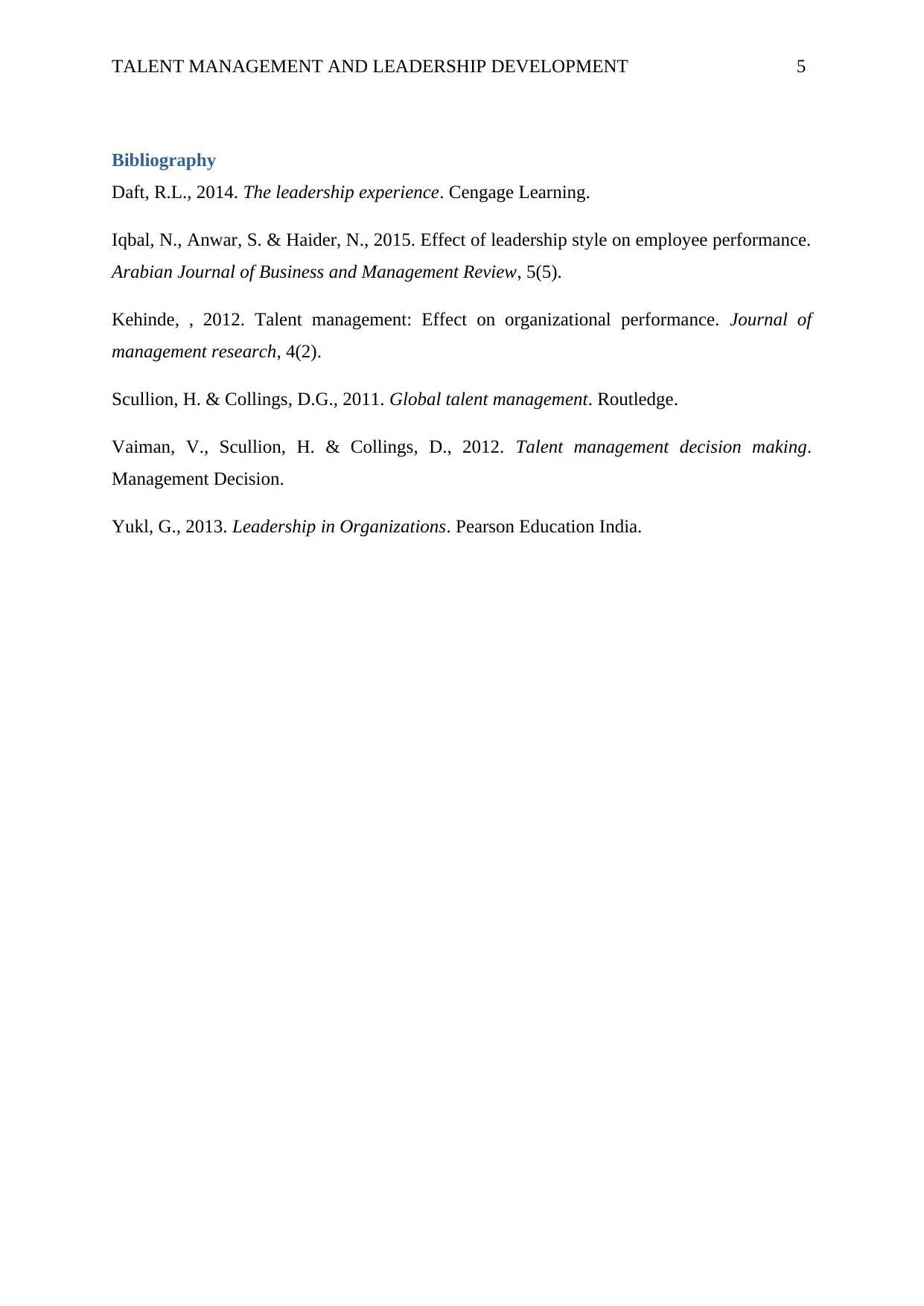
TALENT MANAGEMENT AND LEADERSHIP DEVELOPMENT 5
Bibliography
Daft, R.L., 2014. The leadership experience. Cengage Learning.
Iqbal, N., Anwar, S. & Haider, N., 2015. Effect of leadership style on employee performance.
Arabian Journal of Business and Management Review, 5(5).
Kehinde, , 2012. Talent management: Effect on organizational performance. Journal of
management research, 4(2).
Scullion, H. & Collings, D.G., 2011. Global talent management. Routledge.
Vaiman, V., Scullion, H. & Collings, D., 2012. Talent management decision making.
Management Decision.
Yukl, G., 2013. Leadership in Organizations. Pearson Education India.
Bibliography
Daft, R.L., 2014. The leadership experience. Cengage Learning.
Iqbal, N., Anwar, S. & Haider, N., 2015. Effect of leadership style on employee performance.
Arabian Journal of Business and Management Review, 5(5).
Kehinde, , 2012. Talent management: Effect on organizational performance. Journal of
management research, 4(2).
Scullion, H. & Collings, D.G., 2011. Global talent management. Routledge.
Vaiman, V., Scullion, H. & Collings, D., 2012. Talent management decision making.
Management Decision.
Yukl, G., 2013. Leadership in Organizations. Pearson Education India.
⊘ This is a preview!⊘
Do you want full access?
Subscribe today to unlock all pages.

Trusted by 1+ million students worldwide
1 out of 6
Related Documents
Your All-in-One AI-Powered Toolkit for Academic Success.
+13062052269
info@desklib.com
Available 24*7 on WhatsApp / Email
![[object Object]](/_next/static/media/star-bottom.7253800d.svg)
Unlock your academic potential
Copyright © 2020–2026 A2Z Services. All Rights Reserved. Developed and managed by ZUCOL.




